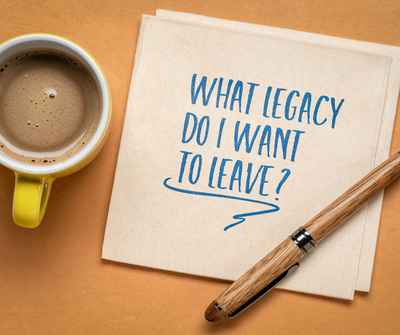Demystifying death: Opening the conversation and planning for the future
7 minute read
In 2022, the Office for National Statistics reported that approximately 40% of people in the UK died with a will in place. For the 60% without a will, the families of the bereaved are left not knowing what to do or what the wishes of their loved ones were. For many, this adds incredible strain and an increased amount of administration when you are already trying to understand and process your grief.

Facing the inevitability of mortality can feel daunting, yet preparing for it can provide profound peace of mind and relief for both you and your loved ones. By taking proactive steps to organise your affairs, you’re not only ensuring that your wishes are honoured but you are providing clarity and direction for those who will be responsible for handling your affairs after you’re gone.
APDO member Julia Jamieson believes in taking time with her clients to gently navigate the process of organising paperwork ahead of time, ensuring that affairs are in order and wishes are clear before the final day comes. By opening up the conversation, she aims to demystify death and empower her clients to navigate the practical and emotional aspects of preparing for the future.
During Demystifying Death Week (6th – 13th May) the Good Life, Good Death, Good Grief organisation aims to “give people knowledge, skills, and opportunities to plan and support each other through death, dying, loss, and care.”
Julia completed their EASE (Early End of Life Skills for Everyone) course, where it was highlighted to her that, “everyone makes a birth plan yet people very rarely make a death plan”. Julia had to stop for a minute to let the reality of this sink in. She realised she had indeed made a birth plan, and is one of the few that has made a death plan, but she struggled to understand why people may not consider this.
The sad reality is that death is not something most people want to talk about. It is something that brings up many unwanted emotions that can be difficult to process. Discussing topics like Sadmin, a term used by Emma Gray founder of Rainbow Hunting, that refers to preparing paperwork ahead of death and legacy planning (managing paperwork after death) not only helps us confront our mortality but also ensures that our wishes are honoured and our loved ones are supported when the time comes.
“Sadly the only certainty for us all is death and although people are often reluctant to talk about it, those who do (and even more so those who take action and sort out what I call the Sadmin) usually gain so much peace of mind. It's fantastic that APDO are joining the conversation and encouraging people to get their paperwork organised and think about their legacy.” Emma Gray
As daunting as it may seem, minimising stress for your family, and leaving behind a clear roadmap for the future is, in fact, an act of love and responsibility toward those who matter most to you.
In today’s blog, Julia explores 3 essential steps to getting your end-of-life paperwork, or Sadmin, organised and how to effectively communicate your wishes to ensure a smoother transition for your loved ones during a challenging time.
Step 1: Essential Documents
Organising your essential documents is the cornerstone of effective preparation for the future. These documents include:
-
 Will: A legal document that outlines how you want your assets to be distributed after your death.
Will: A legal document that outlines how you want your assets to be distributed after your death. - Advance Directive: Also known as a living will, this document specifies your healthcare preferences in case you become unable to make decisions for yourself.
- Power of Attorney: Designates someone to make financial or legal decisions on your behalf if you’re unable to do so.
- Insurance Policies: Life insurance, health insurance, and other policies should be easily accessible to your loved ones.
- Estate Planning Checklist: A comprehensive checklist to help you gather and organise your essential information. (Having one go-to document for all your key information will allow your executors to more easily deal with your estate and financial accounts.)
Step 2: Communicating Your Wishes
Effective communication is key to ensuring that your wishes are understood and honoured. Start by discussing your plans with your loved ones and explaining the reasoning behind your decisions. Be open to questions and concerns, and consider involving trusted family members in the decision-making process. If talking to family is hard, consider talking with a friend or even a professional organiser who can help you to take note of your wishes and ensure they are available for when the time comes.
Ten things to think about:
- Who would you like (or not like) to be with you in your final moments?
- What should happen to your body? (i.e.buried, cremated, donated to science)
- What kind of service – if any – would you like? (i.e. (Non)Religious, funeral home)
- Would you like to have a gathering for friends and family after, if so, where?
- Would you like to have a coffin, if so, do you have a preference on what kind?
- Are there sentimental items that you would like to go with you in the coffin?
- Is there an outfit that you would like to be wearing?
- Do you have a burial site or site where you would like ashes to be scattered?
- Would you like anyone to say or read anything at your service and if so who/what?
- What music would you like played to best reflect your life?
Don’t forget things change, it is a good idea to regularly review your wishes and update them should anything have changed. Remember, this is your funeral, make sure it is what you want.
Step 3: Legacy Planning

Legacy planning extends beyond the practical aspects of paperwork and focuses more on preserving your memories, values, and wishes for future generations. It encompasses more than just financial assets; it's about leaving a lasting impact and ensuring that your values and personal history are remembered and cherished by those who follow.
What does this involve?
1. Executor and Beneficiary Guidance: Selecting the right Executor is crucial to ensuring that your wishes are carried out effectively. Consider someone who is trustworthy, organised, and capable of managing your affairs according to your instructions.
2. Managing Digital Assets: Consider your digital footprint in your legacy planning. This includes email accounts, social media profiles, digital photos, and other online accounts. Make a list of your digital assets and provide instructions for accessing and managing them after your passing.
Tip: Use a password management tool to securely store and share your digital account information with trusted individuals.
3. Documenting Personal History: Preserving your personal history and family stories is an essential part of legacy planning. Creating memoirs, recording oral histories, or compiling a family tree to pass down allows you to share your experiences and wisdom with those who come after you.
Tip: Involve your family members in documenting your personal history to foster a sense of connection and shared heritage.
By taking the time to consider these aspects of your legacy, you can leave behind a lasting impact that transcends financial assets and enriches the lives of your loved ones for generations to come.
Resources and Support
Navigating legacy and end-of-life planning can feel overwhelming, but you don't have to do it alone. There are numerous resources and support systems available to help you through the process, whether you're seeking professional guidance or connecting with others who are going through similar experiences.
For professional guidance, an estate planner, lawyer, or financial advisor can provide support that is tailored to your unique circumstances and help you create a comprehensive plan that reflects your wishes.
To connect with others who are going through similar experiences, there are support groups or online communities, such as Rainbow Hunting, where you can share your concerns, ask questions, and learn from others who have navigated end-of-life and legacy planning themselves.
Start with the End in Mind

“People who make arrangements to address these issues generally feel a real sense of satisfaction knowing they have done everything they can to assist their loved ones should illness or death strike.” Good Life, Good Death, Good Grief
As we conclude our journey through end-of-life and legacy planning, let's celebrate the empowerment that comes from facing the topic of death head-on. By starting the conversation, you'll not only ease the burden on your loved ones but also leave behind a meaningful and lasting legacy that honours your values and wishes.
Preparing for the future isn't about dwelling on the end; it's about embracing the opportunity to shape our legacies and support our loved ones through thoughtful planning.
So, stick with me on this journey, with open hearts and minds, as we take these positive steps to organise our affairs and leave behind a meaningful legacy. Let's do so with the knowledge that we're providing a priceless gift to our loved ones – the gift of clarity, peace of mind, and a lasting connection to our values and memories. Together, we can create a future where end-of-life planning is seen not as morbid but as an act of love and empowerment. By embracing our end-of-life planning, we can leave behind a legacy that truly reflects who we are and what we stand for, enriching the lives of those who come after us for generations to come.
Julia at Orka Living is a Professional Organiser and Declutterer based in South Lanarkshire. To find out more about how she can help you plan for the future, or to find an organiser in your area, check out our Find an Organiser page.






